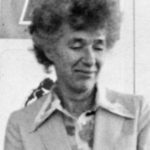 The following is a transcript of the extemporaneous address delivered at Petersburg by Sara Kocher LaPorte on Sunday, March 7, 1976, at the ceremony marking the recognition of Petersburg as an official Bicentennial Community by the American Revolution Bicentennial Administration, Washington, D.C.
The following is a transcript of the extemporaneous address delivered at Petersburg by Sara Kocher LaPorte on Sunday, March 7, 1976, at the ceremony marking the recognition of Petersburg as an official Bicentennial Community by the American Revolution Bicentennial Administration, Washington, D.C.
Her address was used as the Introduction to the book, Petersburg and Shavers Creek Valley: A Review in Words and Pictures, which was published by the Petersburg Bicentennial Committee in 1976. The book was sold out and has not been reprinted.
Had you lived here fifty years ago, probably this afternoon your mother would have sent you to Mission Band at the Lutheran or the Presbyterian Church. In the evening, at 6:30, the Lutherans had to go to Christian Endeavor and the Methodists to Epworth League, and then we would beg off going to services at 7:30. That was our Sunday.
After Mission Band, we had a choice. We could go to Rock Springs about now [March} and look for the arbutus. We could walk up along Shavers Creek and see if the old swinging bridge was still in effect; we’d look to see if the Goodmans had come back to their cottage yet. What else could we do on a Sunday afternoon” Well, I was warned not to go up to the clay bank to the steeple [tipple?], because those old cars were dangerous. Some kids went out to Ed’s. And what was Ed’s? Well,, Ed’s was a swimming hole, apparently named for Ed Huling. Whether he made the dam or not, I didn’t have a chance to ask him. But it was the swimming hole if you wanted to get out of town.
If you didn’t want to leave town, you went down to Bryan’s, and there was the boat and Mrs. Jackson and Therma — oh, the brother’s name left me — Lloyd. The Jacksons would come out and say hello to you or yell at you to get out of there. If you didn’t go down to Bryan’s, you could go to the station, and that was the thrill. I was always afraid to walk under the subway [to the eastbound side of the tracks], and I was warned not to read the things that were written on it! Remember that? I was afraid to go on the other side because of the Italian settlement: Big Red — or Big John — we never knew their names. When the railroad came in [the branch line to Alexandria and Williamsburg in 1900], they brought a lot of Italians to work on it. And rather than they trying to get us here in the village to understand what they were saying or to recognize their names, we named them. And I remember coming into the store, and I was scared to death of Big John. He wore a red bandana around his neck. But there was quite a settlement on the other side of the tracks, so Petersburg did have “the other side of the tracks.”
The other thing you could have done besides going to the station was to sit on the porch — on any of the porches in this area — and count all the cars that were on the freights that were going through. And I know that my mother kept me busy many hours, saying, “How many did you see today?” And I’d say so many hundred. “Well, you can do better than that.” And old dumb me, I sat and counted all the freights, you know.
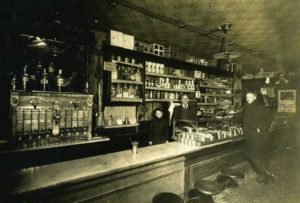 Of course, if Johnny Manbeck’s was open, that’s where we went — to get our ice cream cone. You’d go into Johnny’s, or come down here to the creamery (which stood right here); Jim Duff ran the creamery. I can still smell that sour cream odor. Right across the road was the town spring. Remember the town spring? It was covered up when they cemented the road, but it was right in front of my grandmother’s house here.
Of course, if Johnny Manbeck’s was open, that’s where we went — to get our ice cream cone. You’d go into Johnny’s, or come down here to the creamery (which stood right here); Jim Duff ran the creamery. I can still smell that sour cream odor. Right across the road was the town spring. Remember the town spring? It was covered up when they cemented the road, but it was right in front of my grandmother’s house here.
We weren’t allowed to play ball on Sunday, but we didn’t have the ball field across the creek; it was right here. And the ball field was much used. This is where the kids
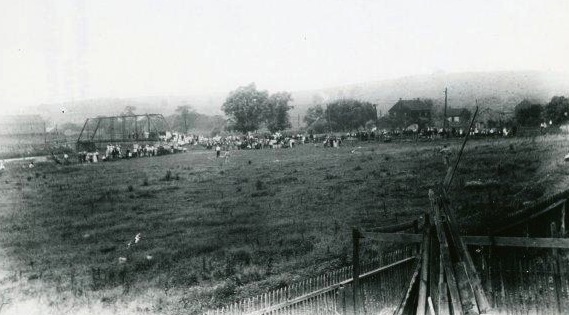
played; this is where the big ball games were held; and, of course, in the summer, where that great Chautauqua tent was put up. Do you remember Chautauqua? You bought tickets — a little cardboard square with a string on it that you put on a button of your dress. I’ll never forget that — scared to death I was going to lose my Chautauqua ticket and wouldn’t get to see those performers.
Thinking of across the creek: the gypsies that came and how they went through town selling their wickerware. And of course, all of us kids were warned not to be on the street because we would be stolen. Can’t imagine any of the gypsies wanting any of the kids in town, but that was a threat to us.
One of my big thrills was walking with my grandmother over to Lower’s. Do you remember the Lower farm where you got your milk? They had a springhouse. Later it became Catty Miller’s — going over to Catty’s — but first it was going over to Lower’s.
Since I was asked to do this, I have gone up one side of the street and down the other, thinking of the people that, at age ten, I loved, and I’ll start with Mame Ellis. I loved to go to Mame Ellis’s. There was Mame and her sister Maisie, who could play “Star of the East” on the piano. Guy Myton was one of my favorite persons. Guy got me out of a lot of jams. Old Mrs. Miles, who lived down here. I loved to go into Mr. Webb’s barber shop. Because he would sprinkle that Jeris hair tonic on me and, oh, did I smell good! I thought that was the greatest; I loved Mr. Webb. Jimmy Myton was one of my favorites. I think every kid in town, when they were age ten, knew and loved Jimmy. He didn’t mind that he was crippled and always made a big thing out of the fact that he walked lame. Speaking of somebody else who was very dear to me, who walked lame, was Charlie Sneath. I would stand at the corner — Charlie went to work at ten o’clock at night — and I would wait for him out here at the corner. He would take my hand, and I would run with him down to Jimmy Myton’s. I had to turn around when I got that far; I wasn’t allowed to go to the station at that hour of the night. But how I waited for Charlie Sneath, and he could run! Of course, you can’t think of baseball without thinking of Charlie and his shouting, “Have no respect. Cut ‘em down where they stand!”
 I am jumping around terribly, I realize. Baseball — it had to be the life of Petersburg, and on Saturday afternoon, the droves, particularly after we had the park on the other side of the creek. I was at that dedication when those stone entrances were made, and there was a big arch: “Petersburg Community Field.” I remember when the tennis courts were put in prior to the war [World War II], under the sponsorship of Reverend Stong, the Lutheran pastor, who was quite a tennis player. And then we lost so many of our boys; so many of them had to go into the service, and the courts, of course, went into disuse. And the baseball sort of went by the way, but I know it’s making a great comeback.
I am jumping around terribly, I realize. Baseball — it had to be the life of Petersburg, and on Saturday afternoon, the droves, particularly after we had the park on the other side of the creek. I was at that dedication when those stone entrances were made, and there was a big arch: “Petersburg Community Field.” I remember when the tennis courts were put in prior to the war [World War II], under the sponsorship of Reverend Stong, the Lutheran pastor, who was quite a tennis player. And then we lost so many of our boys; so many of them had to go into the service, and the courts, of course, went into disuse. And the baseball sort of went by the way, but I know it’s making a great comeback.
Coming on up the street, after Johnny Manbeck’s, was the drug store here at Eva Kirkpatrick’s, and Mary Dittsworth worked in the drug store and would give me samples of things she shouldn’t. Across the street was the marvelous old hotel — the Cutshall’s. And I remember the night of the fire. I had chickenpox and wasn’t allowed to go out of the house. (Do you remember the little signs that were always on your house when you had chickenpox or the measles? And you were quarantined for so many days?) That’s when that house burned, and I remember their running the guests out of the hotel. Petersburg did not have a fire company at that time, and what a job it was. We put wet blankets on the windows of our house to keep it from catching fire — I remember that. Then the other big fire was when this all burned: the Kirkpatrick place, the garage here, the creamery. So Petersburg had two big fires before they got the fire company organized. Where did they get the water? There was a town pump across from the Methodist Church, and there was a pump at my home.
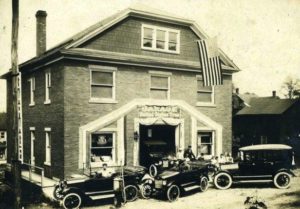 Going on up the street, I remember Ed Anderson and his Flying Cloud Reo, and when it came to town, how we stood in line to see it! Simply beautiful! Old Mr. Houser — I often wondered how he walked up all those steps. He lived where Sam Metz now lives. Of course, Mr. Sachs, and then next door were the Swayne Kirkpatricks. Oh, I missed Mart [Kirkpatrick]. Mart was one of my favorite people. Mart would take us swimming to “the ring.” That was too far to walk, so Mart would pile all of us kids in the car, and we would go over there. (‘The ring” was in the river.) Mr. Good, Frank Good — He was a little short, heavy-set guy, and he lined up all the Memorial Day parades. He always gave me a bunch of honeysuckle to carry, and I hated the stuff; I remember that. All the other kids got flags, but I got this honeysuckle. They’d go out to the mountain and get a big carload of honeysuckle to carry.
Going on up the street, I remember Ed Anderson and his Flying Cloud Reo, and when it came to town, how we stood in line to see it! Simply beautiful! Old Mr. Houser — I often wondered how he walked up all those steps. He lived where Sam Metz now lives. Of course, Mr. Sachs, and then next door were the Swayne Kirkpatricks. Oh, I missed Mart [Kirkpatrick]. Mart was one of my favorite people. Mart would take us swimming to “the ring.” That was too far to walk, so Mart would pile all of us kids in the car, and we would go over there. (‘The ring” was in the river.) Mr. Good, Frank Good — He was a little short, heavy-set guy, and he lined up all the Memorial Day parades. He always gave me a bunch of honeysuckle to carry, and I hated the stuff; I remember that. All the other kids got flags, but I got this honeysuckle. They’d go out to the mountain and get a big carload of honeysuckle to carry.
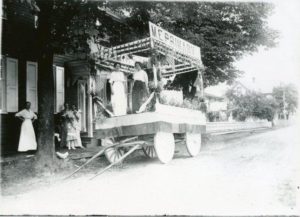 It’s strange how we called everybody what everybody else called them. My grandmother, I feel quite sure, was Grandmother Kocher to everybody in town. And you went to her house to get the risin’. Do you remember the cakes of yeast that she made and sold, two cakes for a nickel? That was to get you started on your baking of bread for the week. Oh, that odor in her house! I can still smell it! But she had risin’ and when she wasn’t making risin’, she was sitting on the front porch rocking, making me count the cars on the freights.
It’s strange how we called everybody what everybody else called them. My grandmother, I feel quite sure, was Grandmother Kocher to everybody in town. And you went to her house to get the risin’. Do you remember the cakes of yeast that she made and sold, two cakes for a nickel? That was to get you started on your baking of bread for the week. Oh, that odor in her house! I can still smell it! But she had risin’ and when she wasn’t making risin’, she was sitting on the front porch rocking, making me count the cars on the freights.
And then Ella Cresswell would come over. Ella was the prim little old lady who lived where the Logan House now is — snow-white hair, always very proper, and she had black horsehair furniture in her parlor. I remember that.
Do you remember Esther Stouffer? I think she was the only girl in town who had a player piano. And that was a big thrill, to go over to Esther’s and play “Dream Train” on her player piano. And she would give us chocolate bon-bons to eat. I remember that of Esther Stouffer.
Mary Castine — your mother always thought you had to take music lessons. So some time in your life you went to Mary’s and sat there, and she tried to teach you piano.
In connection with my father and his business, the old stockyards — as a kid, I remember sitting down there and watching the droves of cattle coming down Main [King] Street. And I always knew they were coming ‘cause Dad would say he was going up the valley, and he’d line up all the kids to drive the cows. Do you remember when they would — oh, there wasn’t any traffic; I was going to say, “halt traffic,” but it didn’t have to halt. They came down Main Street and put all of the cows into the stockyard, and then they were shipped to Philadelphia. And, of course, Frank Culp was one of his helpers. I remember Mr. Culp.
When we were out at Ed’s swimming, we always got terribly thirsty, and old Mrs. Huling never minded giving us a drink of water. And one reason I liked to go up was to see Meryle. Meryle was one of our First World War casualties. Meryle would be sitting in the chair, doing a kind of — making little rugs or mats for on tables. I loved spending an afternoon with Meryle.
This is rather gruesome, but I am going on to the dead. Do you remember when they always put the wreath on the door? Mr. Kell sang the hymn. And I guess at every funeral I was dragged to as a child, Mr. Kell would sing “There’s No Night There.” And, oh my, I thought that was the most horrible experience I ever went through, but he sang it beautifully. I remember even when my own father died, it was one of the things we had to have — Mr. Kell singing “There’s No Night There” — and I dreaded it.Mr. Temple was our undertaker, old Isaac Temple. And when he wasn’t embalming, he was making tables and refinishing the woodwork. If you had an old desk or an old cupboard that you wanted to look like real stain, you got Isaac Temple to do it.
And speaking of painting, I bet most every house in Petersburg was papered by Sidney Thompson. Do you remember old Sidney Thompson? And I suppose every piece of spouting that was put up was put up by Mac Swope. Do you remember Mac? Had a little shop at the lower end of town and lived at the upper end. I can still see Mac walk up and down the street.
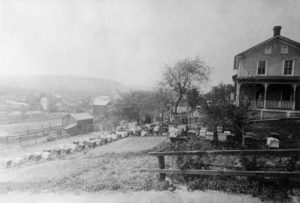 I suppose every cake of honey that was ever eaten in Petersburg was raised by Aaron Howell. And so each person along the way played a part. I imagine this afternoon, old Henny Hoffman would be going down to see if the fish would start biting.
I suppose every cake of honey that was ever eaten in Petersburg was raised by Aaron Howell. And so each person along the way played a part. I imagine this afternoon, old Henny Hoffman would be going down to see if the fish would start biting.
Another thing we did on a Sunday afternoon — there were two parrots in Petersburg, believe it or not. I don’t know if there are any parrots here today. But Fannie Stevens, down on Goose Green, had one parrot, and old Mrs. Hoffman had the other parrot. And that was something for us kids to do — to go and talk to those parrots in an afternoon.
I remember when the first permanent was given in Petersburg. We had heard about permanents. Boy, we girls who had stringy, straight hair wanted a permanent! And Greta Sloat, who was Pinky Anderson’s sister, lived in Reading. She was studying to be a beautician, and she came to Petersburg and gave permanents. I think Rose Anspach did later, and there were different ones, but I remember Greta Sloat giving the first permanent.
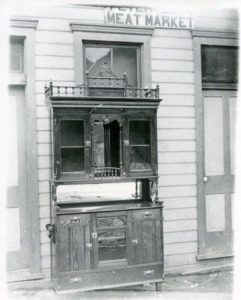 Another dear person was old Mr. Hewitt, who never charged you for that bone for your dog. You could always go in, and Mr. Hewitt would be chewing. He always had something in his mouth; he didn’t “chew,” but he chewed. The butcher shop was down here in the lower end, with the sawdust bit and the whole thing. And, of course, I always had a dog, and Mr. Hewitt didn’t have to ask me what I wanted. I would just stand there, and he would give me this big juicy bone. Mr. Hurley was just as nice about giving bones to our dogs; he had the second butcher shop.
Another dear person was old Mr. Hewitt, who never charged you for that bone for your dog. You could always go in, and Mr. Hewitt would be chewing. He always had something in his mouth; he didn’t “chew,” but he chewed. The butcher shop was down here in the lower end, with the sawdust bit and the whole thing. And, of course, I always had a dog, and Mr. Hewitt didn’t have to ask me what I wanted. I would just stand there, and he would give me this big juicy bone. Mr. Hurley was just as nice about giving bones to our dogs; he had the second butcher shop.
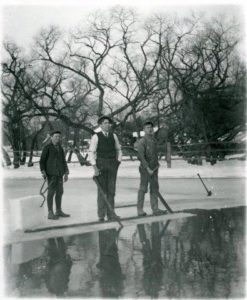
It was a thrill when they cut the ice. Do you remember that? They cut it down here, and there was an ice house. (Eddie Huling’s shaking his head.) Do you remember that, Ed? And, oh my, they stored that ice, and then they would haul it out as they needed it for our butcher shops.
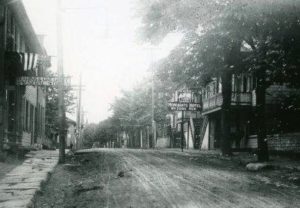 What did Petersburg have? Well, we had five grocery store; we had a furniture store. I’m talking about when I was a kid. I didn’t go back prior to the First World War. We had the two hotels, the one here and the one at the lower end of town.
What did Petersburg have? Well, we had five grocery store; we had a furniture store. I’m talking about when I was a kid. I didn’t go back prior to the First World War. We had the two hotels, the one here and the one at the lower end of town.
Anderson’s Garage, with the “Flying Cloud,” plus a machine shop down below. I think Sid Port was the mechanic, and later John Butler. But that was quite a place. You took the old cars to the machine shop. We had the barber shop, of course. We had a shoe shop — Jimmy Haddon’s, right across from what is now a factory and was our high school. Remember Jimmy Haddon? You’d go in there and get your shoes and heels fixed. Eva Kirkpatrick had the restaurant here. Johnny Manbeck’s — you could always get something to eat at Johnny’s.
The stores — my father and Mr. Gregory had the big one; you know, the coal, the wheat, shoes, dress material, the works; pickles in the jar, the big blocks of cheese, the coal oil, and — thinking of unpleasant things — where you chopped the tobacco. That was often my job — to take that big plug and cut that tobacco into sections. Mr. Gregory and my dad; Mac Swope across the street.
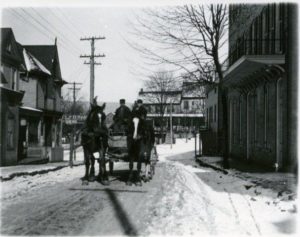 Coming on up, Florie Stewart; remember Florie Stewart? He was in a little shop; later it became the Petersburg post office, and then, I guess, a Laundromat. Huston’s furniture store — that’s where you got your linoleum. Some of you probably got your first living room suite from Huston’s; and your first Atwater-Kent radio. You could get that at Huston’s.
Coming on up, Florie Stewart; remember Florie Stewart? He was in a little shop; later it became the Petersburg post office, and then, I guess, a Laundromat. Huston’s furniture store — that’s where you got your linoleum. Some of you probably got your first living room suite from Huston’s; and your first Atwater-Kent radio. You could get that at Huston’s.
I’ll never forget that: I went and looked at that thing and thought it was gorgeous, but you didn’t get it! There was an Oriole Store. Do you remember that? That was down the alley, catty-cornered from Hurley’s.
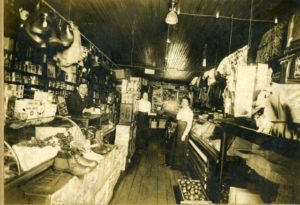 Going on up the street, we had Young’s Store. It was pretty much a department store. I don’t know if you could get shoes there, but I know I went there to get pictures at Christmastime. He always put stuff out on the counters right before Christmas — boxes of handkerchiefs and that kind of thing. I could have missed another emporium here in town. The creamery, of course. Nothing on the back street [Washington]. For a long time the back street wasn’t paved, so you didn’t do too much on the back street. We had the bank where it is now when I was a child; Mr. Little was in the bank. I loved his daughter, Mildred. Mildred went away to college, do you remember? Mildred Little.
Going on up the street, we had Young’s Store. It was pretty much a department store. I don’t know if you could get shoes there, but I know I went there to get pictures at Christmastime. He always put stuff out on the counters right before Christmas — boxes of handkerchiefs and that kind of thing. I could have missed another emporium here in town. The creamery, of course. Nothing on the back street [Washington]. For a long time the back street wasn’t paved, so you didn’t do too much on the back street. We had the bank where it is now when I was a child; Mr. Little was in the bank. I loved his daughter, Mildred. Mildred went away to college, do you remember? Mildred Little.
I remember going to the station with Burr Rorer with the old cart to pick up the mail and bring it back up to the post office. Burr also had a couple of very good sour cherry trees that we kids would raid occasionally. I remember old Burr pushing that cart, heavily laden with all the mail, not just for Petersburg, but the mail that went up the valley.
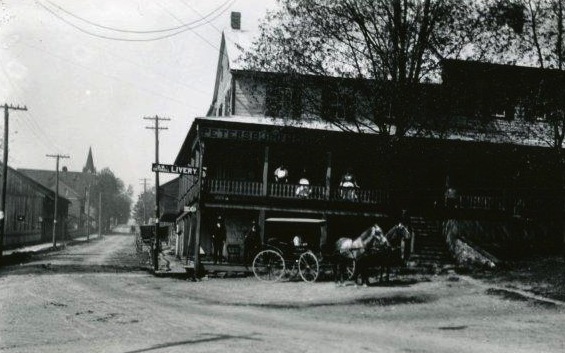
Do you remember the hack? You could ride from here to McAlevy’s Fort, and my uncle, Will Orner, was the driver. It had two little wooden seats in it. And you could get the hack at certain times of the day and eventually land at McAlevy’s Fort, stopping at Cottage, Mooresville, Manor Hill, Saulsburg, Ennisville, and eventually the Fort. Big trip — going up there in those days!
Petersburg was very community minded. We had a very active Civic Club here in town, and these women put on suppers. If anything had to be done, check the Civic Club. And talking of suppers, the big highlight was the Alumni Banquet up in that old school! I could just hardly wait until I was old enough to go to the Alumni Banquet. But I did get a chance to go and see how everybody was dressed, if I would promise to wait tables. Usually Fred Myers was in charge of the food, and I can still see Mr. Myers going around telling everybody what to do and getting the meal on the table. Do you remember Fred Myers? He was sort of the instigator of the whole thing. But, oh, that Alumni Banquet was really something, and it’s great we still have it.
We had a few people that you never knew who they were or where they came from. But they were in Petersburg! One was Tom Harden, who always came around in the spring of the year, dug our garden for us, slept in our garage, and scared us to death when we’d go out to get in the car, and there’d be Tom! You’d say, “Well, why didn’t you come up to the house; we’d have given you a bed?” But Tom liked to sleep in the car, in the garage. Rollie McFadden: I don’t know, — well, I do know who Rollie was; he had a family here. Rollie was a town fixture; everybody loved Rollie. He was always interested in stopping and talking with us.
Do you remember how we used to get things in Altoona, when we couldn’t get up to Altoona? Do you remember the two ladies that would always buy for you, do your shopping? Mrs. Anna Hohman and Mary Longenecker — Mary “Up-street.” There were two Mary Longeneckers, so we had Mary “Down-street” and Mary “Up-street.” Mary “Up-street” was married to Walt Longenecker, and Mary “Down-street” was married to Ed. But Mary Longenecker went to Altoona a couple times a week, and she’d do all the shopping for you. These two ladies’ husbands worked on the railroad, and so they had passes; they could go for free. They were marvelous! Mrs. Longenecker also made many of the dresses that we wore when we were kids. “Take your piece of material to Mrs. Longenecker.”
Oh, I’ve got to stop this! I think of Hattie Port; she kept roomers and served meals and kept schoolteachers. You’d usually get into Hattie Port’s just to see what teachers were living there and what they were doing. We loved to have the low-down on our teachers in those days.
I dare not omit Aunt Rachel Wright and her daughter, Maggie. Aunt Rachel was an old, old lady when I was a little girl, and she seemed to live forever. When you think of Aunt Rachel, you think of the Lutheran Church, I suppose because she was the mainstay. She was a lovely old soul, and I was always thrilled to think she was married to a captain who had charge of the canal that went through town.
Our doctors: Dr. Plymire — many of you were delivered by Dr. Plymire, or he delivered your offspring. I don’t remember Dr. Campbell, just his name. Dr. Keichline delivered me, and I knew him later, when he was in Huntingdon. But we all loved to go to Dr. Plymire’s, and he’d give you those iodine pills for the sore throat. Do you remember those? He’d pour out a big handful; and you’d say, “Oh, I don’t want…,” and he’d show you how easy they were to take. He’d pop a whole lot of them in his mouth. I thought, okay, go ahead if you’re that crazy about those!
 The singing! Petersburg had a lot of music. We had a band, and they practiced up above Tom Anderson’s Garage. They practiced one night a week, and in the summer the windows should be up, and you could hear them up there. And Grant Miller, who lived down here, you could see him going up the street with his clarinet. All the men played in the band. When the strawberry festival was held in the schoolyard, the band always played. Most any night you could hear Carl Lovell and Alf Arndt harmonizing someplace in town; they had beautiful voices.
The singing! Petersburg had a lot of music. We had a band, and they practiced up above Tom Anderson’s Garage. They practiced one night a week, and in the summer the windows should be up, and you could hear them up there. And Grant Miller, who lived down here, you could see him going up the street with his clarinet. All the men played in the band. When the strawberry festival was held in the schoolyard, the band always played. Most any night you could hear Carl Lovell and Alf Arndt harmonizing someplace in town; they had beautiful voices.
The school plays we put on that little stage up there in the high school. But, my gosh, we must have been good, because I remember going clear over to Pine Grove Mills to put on a play at the Grange; and out to Marklesburg. No, that wasn’t when I was in high school; I was probably in eighth grade. But they needed some little kid in their high school play, and I was always chosen; I loved that. So we did have school plays. We had the music. We had a high school orchestra. Joel [Steel], do you remember? We brought up Dr. Morelli from Huntingdon, and we had a very active high school orchestra here.
We had a chiropractor, Wilbur Fry. Anything out of joint, you went to Wilbur. And you didn’t need to be embarrassed, because he was blind. Do you remember that? He couldn’t see, and so when he’d say to take off this, your mother would say, “Go ahead, he can’t see, so take it off.” I don’t know, Wilbur must have gotten a great deal of business this way. I do know he gave us “Big Boy” chewing gum, long sticks. I don’t know whether you can even buy it anymore, but I loved to go with Millie Sachs to the chiropractor.
Old Sis Armstrong, Etta Houck, George Summers, Minnie McCafferty. Rose Ross, down over the hill, and “Low-cut” Ross, and I never knew why they called him “Low-cut,” but he was “Low-cut” Ross; I don’t even know what his right name was. Andy Saner and the cantaloupes — going through town selling cantaloupes, and how we’d try to steal them and tease him and mimic him. Oh, my! The Horace Ross family. Johnny McCool and his sister Nancy. Mr. Grant Piper at the Post Office and his wife, Hattie, who was my Sunday School teacher for ages; how much we loved her. Henry Shipton. Old Mrs. Bruner, who wouldn’t let us roller skate in front of her house; she lived where Etniers live now. Nora Burd down on Goose Green, who made the best homemade bread; and I’d go down there with Mabel and her other daughters after school to get bread. The Breons — Frankie Breon, Elmer, all the Breon’s living down there. The Franklins — Punch Franklin. He and Brice Nale — the Nales lived down there too — always on the creek in the winter, ice skating. Those fellows taught me to ice skate. Gabby Stewart — can’t forget dear old Gabby. And later, “Joe the Russian.” We weren’t sure about Joe’s name, so we just gave them names; so he was “Joe the Russian.”
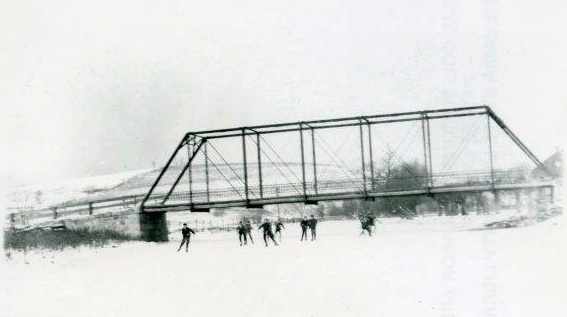
I’m going to stop; this could go on and on and on. I know I’ve missed some of your families, and I didn’t mean to. The outstanding baseball players; of course, we always think of the “King.” Mention baseball in Petersburg, and it has to be “King” Rupert. The Pipers — Plummer, Abe, Tom, Raymond, Mart. The Lightners — Roy, Cloyd. Families, we used to say, if that wasn’t your name, you didn’t get a chance to play.
I’m going to close on this: I’d love once more to hear the kids play “Hunt the Grey.” Remember that? You younger ones don’t even know; we had a marvelous time. It was great growing up in Petersburg. I had a beautiful childhood, and I know that those fifteen or eighteen years that I spent here were the greatest that ever happened to me. I loved most everybody in town. I can’t say they loved me; I was one of those little persons that was always all over the place. But, by golly, I made it into every house in town!
I’ll never forget. I couldn’t get into Cresswell’s house. They lived in the brownstone up on the back street behind the grade school. Zachariah Cresswell, I think his name was. Anyway, they were real old people, and they wouldn’t let us kids come in. They had no young kids of their own. So I went and picked asparagus up here on the hill, and I knocked on the door one afternoon and asked them if they wanted to buy some asparagus. Apparently, they wanted it badly enough that they left the door open, and said, “Just a minute ‘til we get the money,” and I got into the kitchen! At least, I was in the house. But I was in everybody else’s house in town, and I think this was true of most of us kids. At some time we were in everybody’s house in Petersburg, and it was great!
At night, hearing those kids — the older ones in town — holler “Hunt the grey!” And then you’d hear somebody down on the lower street holler, “Lost track.” Then you’d tear up one street and down the alley, tear up another one! Oh, it was marvelous! And, oh, the fun we had in the winter; we ice skated. The bobsleds started clear up there and went clear over to Lois Henderson’s. All you needed in those days was somebody on the corner to stop the traffic — there wasn’t that much traffic — and that bobsled would take you the whole way starting up Scott’s hill. Swimming all summer. The boats. The canoes. So these things are still here, okay? Let’s take advantage of them.
